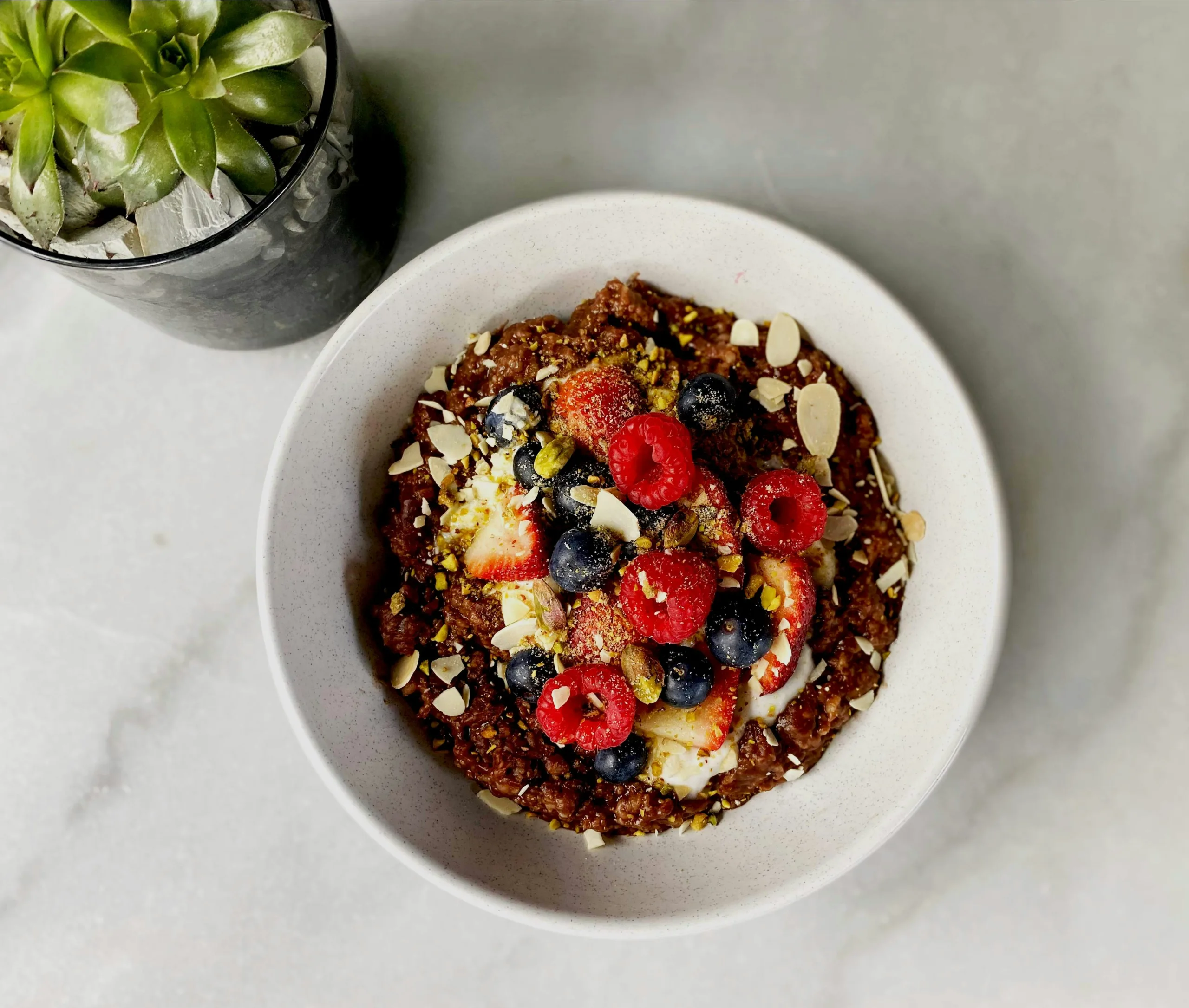Food is a powerful tool—especially when it comes to your health. Research has shown that eating a plant-based diet has the ability to vastly improve health and well-being. Plant-based foods contain the vitamins, minerals, phytonutrients, and antioxidants that your body needs for strength, energy, and zest—all while protecting you from disease.
Don’t be tricked into thinking a plate of grains, legumes and veggies is plain, boring, or mundane. In fact, you can take any dish from your favorite restaurant and turn it into a delicious plant-based meal.
Learning more about what “plant-based” really means and trying new veggie-filled recipes will help you experience the mental and physical benefits of plant-based eating for yourself.
Here are five reasons why you should consider eating a plant-based diet—as well as a few of recipes to help you kickstart healthy habits.
What is a Plant-Based Diet?
“Plant-based” is an umbrella term that is often used interchangeably with vegan, but these terms do not actually mean the same thing.
Veganism means that a person does not consume any animal products, including dairy, eggs, meat, or fish. Alternatively, vegetarianism – sometimes confused with veganism – means abstaining from fish and meat, though people may consume dairy products or eggs.
A plant-based diet means that your meals mostly consist of plants: fruits, vegetables, grains, legumes, nuts, and seeds. It may also incorporate high-quality animal protein, such as grass-fed beef or pasture-raised eggs. Think of a plant-based diet as one consisting of whole, minimally processed foods coming from nature.
Going plant-based does not mean you need to completely stop consuming animal products. Think of committing to a plant-based diet as shifting towards more nutritional balance. If you’re a meat lover, you can still consume animal products! Adding more plants into most diets, and achieving more balance via added fiber, vitamins and minerals, can still offer many advantages.
In fact, the more plant-based foods you consume, the healthier you will be. Have you ever heard of Blue Zones? “Blue Zones” refers to geographic areas where people have lower rates of chronic disease, and more overall longevity, than other areas. Some Blue Zones include Japan, Sardinia, Costa Rica, and Icaria (an island in Greece). One thing common to a Blue Zone is that inhabitants primarily eat a 95% plant-based diet rich in legumes, whole grains, vegetables, nuts, and seeds—all of which reduce the risk of death.
Plant-Based Diets: Why Try It?
The benefits of a plant-based diet are extensive. Studies have shown that eating a plant-based diet reduces your risk of obesity, heart disease, diabetes, and cancer.
Need more reasons to try a plant-based diet? Take a look at all the things trying to go more plant-based” can do for your quality of life.
1. Aids in Weight Loss
The research is clear—plant-based eaters tend to be thinner and lower in body mass than those who eat a diet high in inflammatory foods such as meat, dairy, and processed foods.
Plant-based diets are helpful in weight loss because they contain an abundance of foods that are high in fiber, which slows digestion and keeps you full and satisfied for longer. These foods also tend to be lower in calories and higher in nutrients, which promote good gut health.
A healthy gut results in a strong immune system and even increases the secretion of mood-boosting hormones. When you’re happy and healthy, you’re more likely to make empowered eating choices, move your body regularly and participate in other healthy activities—all of which not only keep you healthy but also have a positive impact on your waistline.
2. Balances Blood Sugar
The foods that you eat directly impact insulin resistance. Consuming whole foods that are low on the glycemic index—such as nuts, seeds, and healthy fats—keeps your blood sugar balanced. This helps you stay satiated longer and reduces sugar cravings. According to the National Library of Medicine, a vegetarian diet is associated with a substantial reduction in diabetes incidence.
Dr. Michael Greger, physician and author of How Not to Die, often advocates for lowering the risk of chronic disease through a whole-food, plant-based diet. He furthers the findings of the study by explaining that a plant-based diet could even reverse diabetes.
3. Decreases Risk of Cardiovascular Disease
In the past, some studies have surmised that our genetics alter our risk of death from heart disease. Yet a migrant study shows that it is actually diet and lifestyle which play more of a role. According to a study led by Dr. T. Colin Campbell, Professor Emeritus of Nutritional Biochemistry at Cornell University, chronic disease is much less prevalent in those eating a plant-based diet.
Additional studies have also shown the benefits of plant-based diets for your heart. Dr. Dean Ornish, the President and Founder of the non-profit Preventive Medicine Research Institute, highlighted how heart disease could be reversed using proper nutrition. According to the Journal of the American Heart Association, plant-based diets are also associated with lower incidences of cardiovascular disease and mortality.
Plant-based foods—which are often not processed—contain loads of fiber and very little saturated fats and cholesterol, which is a winning combination of nutrients for heart health.
4. Improves Sleep
A good night’s sleep is refreshing and important for your daily success and overall health. Plants have high levels of sleep-inducing nutrients such as fiber, isoflavones, and phytonutrients, helping to bring you some peace when your head hits the pillow. Getting a majority of your protein intake from meat can be taxing on the digestive system, which can impact your sleep.
Plant-based foods also can contain tryptophan and melatonin, which are known to aid in good sleep. Plus, if you struggle with achy muscles or sleep apena, the anti-inflammatory benefits of going plant-based could help you catch more zzz’s.
5. Supports Brain Health
Some people think that a decline in brain health is an inevitable part of aging, but that doesn’t have to be the case. Research has shown that there is a direct correlation between healthy food and lifestyle choices, and a lower risk of cognitive decline and dementia.
As reported in Medical News Today, a study led by Koh Woon Puay, a professor at the Duke NUS Medical School, found that people who adhere to a mostly plant-based diet are less likely to develop cognitive impairment as they age.
In addition, emerging research shows that blending food and nutrition with exercise and meditation is associated with improvement in mental health and mood disorders. A study published in the American Journal of Health Promotion found that a plant-based diet decreases feelings of anxiety, depression, and fatigue while boosting overall health and wellness. Nutrition is not just about how you feel, but about how you think. So bringing more whole foods into your diet can be the first way to combat imbalance in your life.
Healthy and Delicious Plant-Based Recipes from Alicia
Since I began my journey in nutrition, I have studied with some of the most lauded professionals within the health and wellness sphere. Through exploring over 100 dietary theories, I have developed a deeper understanding of how impactful diet and nutrition can be on your body, your mind, and your spirit.
Now, as a Nutritious Life Master Certified Nutrition and Wellness coach, it is my job to educate you on the role that food can play in preventing chronic disease.
But don’t worry—I have plenty of information for you if you’d rather discuss how to stop emotional eating or how to achieve any nutrition or self-care goals. Proper nutrition can improve your overall health and wellness, and you can have fun creating healthy plant-based recipes as well!
Creating healthy and delicious meals is my passion. As a food lover, you can often find me swooning over a Jean George avocado pizza with fresh jalapenos, or whipping up a new recipe in the kitchen. Right now, some of my favorite plant-based recipes are:
I swap quinoa for bulgur but any grain is delicious with this salad.
To check my own plant-based recipe, click the link below:
(Image: Shutterstock)






























